What Is Better: Whole Wheat or Whole Grain for Weight Loss?
Should you choose whole wheat or whole grain for weight loss?
Eating more whole foods is something most people interested in losing weight strive to do.
However, when phrases like whole grain vs whole wheat are used on food labels, it can be difficult to determine which item is the better option.
Don’t worry, you will have the answer in this post!
Let’s find out!
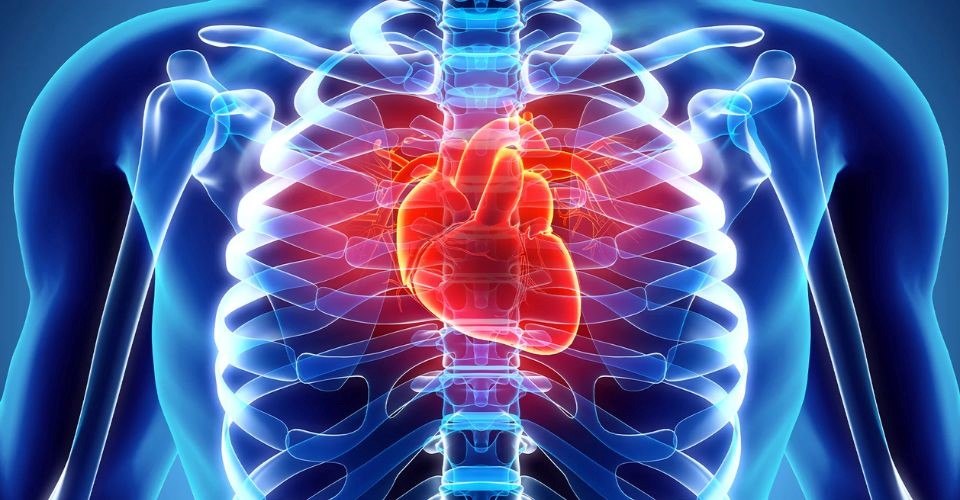
Whole grain vs whole wheat for weight loss?
What Are The Health Benefits of Whole Grain?
The term "whole grain" refers to the use of the complete grain kernel, regardless of the kind of grain, in the production of the product.
Whole grains are a very nutritious diet with several health advantages. Below are some of the health benefits of whole grains.
Reduce all-cause mortality risk
According to research, the fewer portions of whole grains consumed, the greater the risk of dying from any cause.
The major reason for this is assumed to be the advantages of whole grains in lowering the rates of type 2 diabetes, cardiovascular disease, cancer, and obesity.
These four health disorders kill millions of people each year, and whole-grain consumption is linked to a lower risk.
Control blood sugar
Whole grains have been researched to see whether they might help reduce the chance of getting type 2 diabetes.
Consuming 2 to 3 servings (30-45 grams per day) of whole grains per day can considerably minimize the risk.
In addition, consuming 1.5 servings of whole grains every day helps lower blood sugar and insulin levels.
Researchers think that the magnesium and chromium included in whole grains aid to balance blood sugar and insulin metabolism.
Whole wheat vs whole grain diabetes? Read more in Barcode Live!
Reduce the risk of cardiovascular disease
According to research, consuming 28 to 30 grams of whole grains per day decreases total blood cholesterol and low-density lipoprotein (LDL), or "bad" cholesterol.
Regular consumption of whole grains reduces the risk of developing cardiovascular disease or having a stroke.

Whole wheat helps reduce the risk of cardiovascular disease
Also, people who consume whole grains have a decreased risk of dying from cardiovascular disease.
Reduce the risk of some cancers
Studies that compare people who consume the most whole grains to those who consume the least suggest that those who consume the most have a lower chance of acquiring colorectal cancer.
Similar findings have been obtained for pancreatic and stomach malignancies.
Furthermore, two meta-analyses found that eating more whole grains is linked to fewer total cancer mortality.
Assist with weight management
Eating whole grains may assist you in controlling your weight and keeping a healthy weight.
According to research, those who eat more whole grains had lower body mass, higher optimal body fat percentages, and less abdominal obesity.
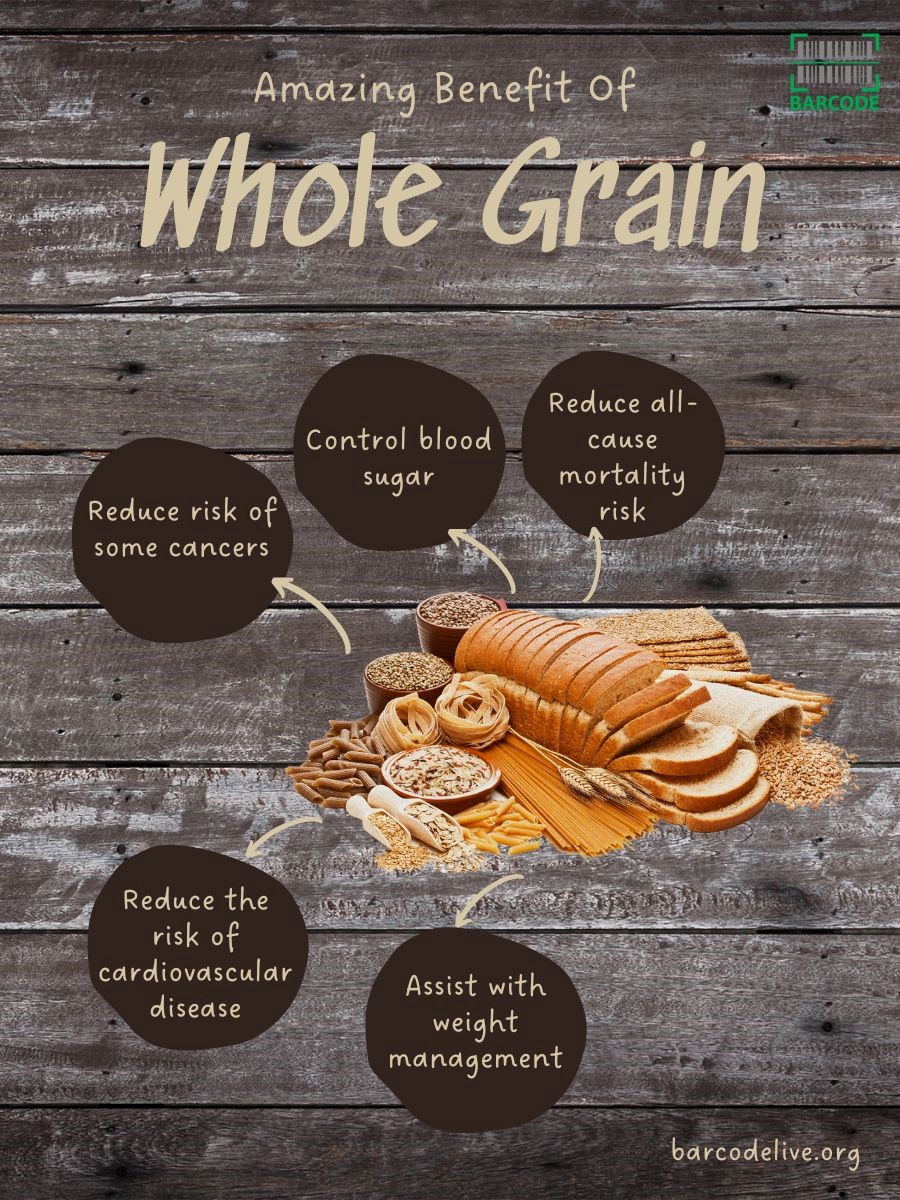
Advantages of whole grain
What Are The Health Benefits of Whole Wheat?
Whole wheat is similar to whole grain; however, it is only found in the wheat plant. Whole wheat on a label indicates that the product was prepared to utilize the complete wheat kernel.
Because whole wheat products are manufactured from whole grain wheat, they provide the same health advantages as whole grains.
Nevertheless, the content and amount of vitamins, minerals, fiber, and macronutrients in a whole grain product will vary depending on the grain (protein, carbohydrates, and fat).
Depending on whether it's enriched, most whole-wheat bread includes iron, potassium, and the B vitamins thiamin, riboflavin, niacin, and folate.
According to the USDA, one slice (43 grams) of whole wheat bread includes 80 calories, 0 grams of fat, 20 grams of carbs, 3 grams of fiber, 4 grams of sugar, and 5 grams of protein.
Switching commonly found refined goods like pasta, crackers, and bread with whole-wheat counterparts will offer you all of the benefits of consuming whole grains.
It is also a simple approach to increasing your consumption of whole grains.
Among lots of products on the market, Aashirvaad Whole Wheat Atta is one of the most preferred whole wheat products with great flavor and nutrition.
You may try it!
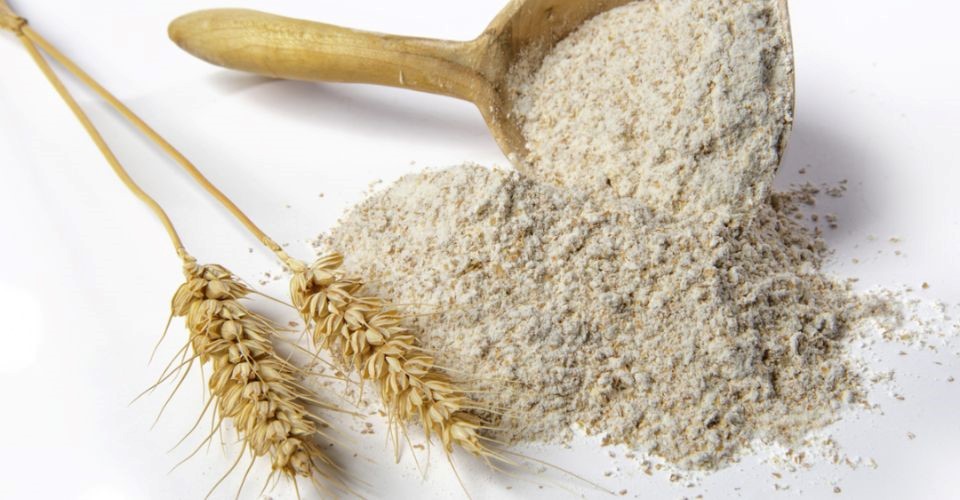
Health benefits of whole wheat
Should You Choose Whole Wheat Vs Whole Grain For Weight loss?
Is whole grain flour vs whole wheat flour the same? The answer is no, but both can help you lose weight.
But to be specific, researchers discovered that when comparing whole grain vs whole wheat bodybuilding, eating whole grains dramatically increased fiber and other important nutrient intakes.
-
It aids with weight loss
For example, exchanging low-fiber, refined carbs like white bread and white rice for small portions of nutrient-dense, high-fiber whole grains may help some people lose weight.
However, controlling portion size and frequency of whole grain consumption may be beneficial for weight management.
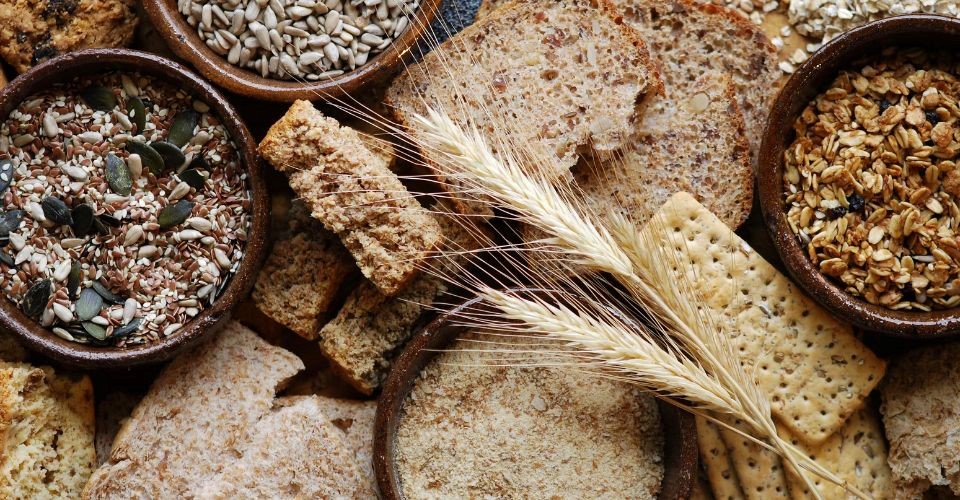
Whole-grain vs whole wheat for weight loss are both good
-
It aids with fat loss
An exhaustive assessment of whole grain studies indicates that substituting refined grains with whole grains may reduce body fat even when body weight is constant.
Selecting whole grains versus refined grains may result in internal body changes such as fat reduction, which influence more than simply weight.
Lowering body fat mass and LDL cholesterol are both good for heart health.
How To Add Whole Grains To Your Meal?
Here are some suggestions for incorporating more whole grains (and fiber) into your diet:
-
Breakfast should consist of whole-grain oatmeal: To get the most nutrients out of your whole-grain meal, choose steel-cut or old-fashioned oats with no added sugar.
-
Consume whole-grain crackers: Seek whole-grain crackers with few ingredients and a high fiber content.
-
Wrap your sandwich ingredients in whole-grain flatbread: A whole-grain wrap or flatbread, rather than white bread or fluffy rolls, will keep you fuller for longer.

Add whole grains to your meal
-
Use whole-grain cereal to "faux-fry" your favorite foods: Try with a brilliant culinary trick by exchanging white flour and heated oil for high-fiber cereal and eggs.
Whole grains are more nutritious than whole wheat because they include more fiber. Although 100% whole wheat is a form of whole grain, other goods have a combination of wheat and white flour.
Look for whole grain or 100% whole wheat labeling, since these are both healthy options.
These are some of the greatest whole grains to use in your weight-loss diet:
Barley (Jau)
Finger Millets (Ragi)
Brown Rice
Buckwheat (Kuttu)
Quinoa.
According to Dr. Patel, compared to multigrain bread, whole wheat bread is healthier.
Because every slice of 100% whole wheat bread has the whole grain, which is intact, every slice contains nutrients including B vitamins, iron, zinc, copper, manganese, and magnesium.
Bottom Line
Both whole grains and whole wheat include all three parts of the grain kernel and are equally nutrient-dense. And now you have the answer to “Should you choose whole wheat or whole grain for weight loss?” After all, we hope you find this post useful and get the suitable one for the most health benefits.
Source:
https://bmcmedicine.biomedcentral.com/articles/10.1186/s12916-015-0294-7
https://linkinghub.elsevier.com/retrieve/pii/S1556370716300736
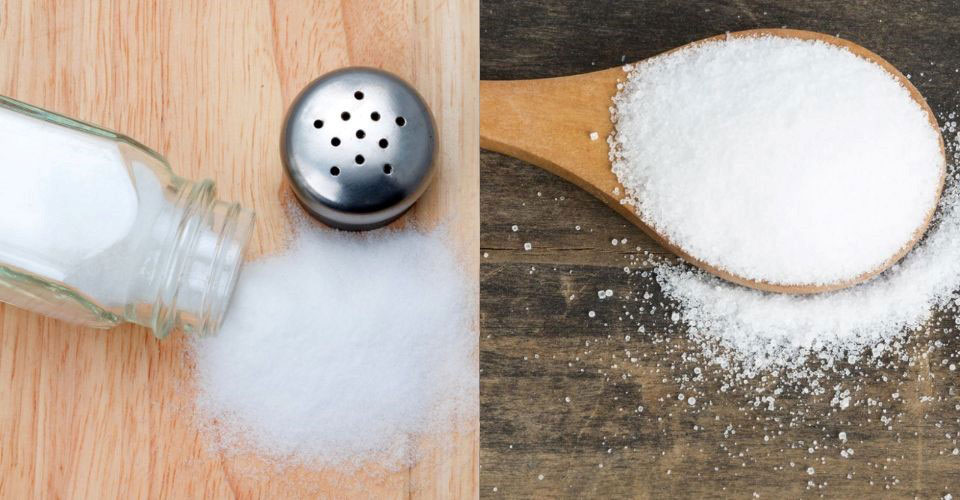
![Iodized Salt vs Sea Salt Comparison [Nutrition, Taste, Cost & More]](https://barcodelive.org/filemanager/data-images/imgs/20230328/Tip_Iodized%20Salt%20Vs%20Sea%20Salt_1.jpg)

6 Comments
Mohit Arya
Thanks for your helpful post.
Leave a Comment
Your email address will not be published. Required fields are marked *Barcodelive
Sound good
Leave a Comment
Your email address will not be published. Required fields are marked *Blakely White
What do food product labels that say “whole wheat” or “100% whole grain wheat” mean? Are these better for health?
Leave a Comment
Your email address will not be published. Required fields are marked *Barcodelive
Your point is that the label isn't regulated in the way it should be, and that's true, but it's not true that the whole wheat label is just nothing.
Whole wheat products are qualitatively way different than other products, and OP just wants to know what that difference is
Leave a Comment
Your email address will not be published. Required fields are marked *Mohit Arya
How much of a difference does white vs whole grain/wheat diet make in terms of weight loss?
Leave a Comment
Your email address will not be published. Required fields are marked *Barcodelive
The biggest difference between white bread and whole-wheat bread is in the way people eat them. White bread is often eaten as a treat, as a component for various and sundry concoctions due to its rather neutral flavor profile. Also, white bread is a common snack food or fill-up food, with people often consuming several slices or a whole loaf or bread bowl either singly or as part of a meal.
Whole wheat doesn’t lend itself to bingeing, being toast points, or other uses; it is usually eaten as sandwich ends or as a single slice. As a result, switching from white to whole-wheat may also result in a less bread-focused diet.
Leave a Comment
Your email address will not be published. Required fields are marked *Leave a Comment
Your email address will not be published. Required fields are marked *